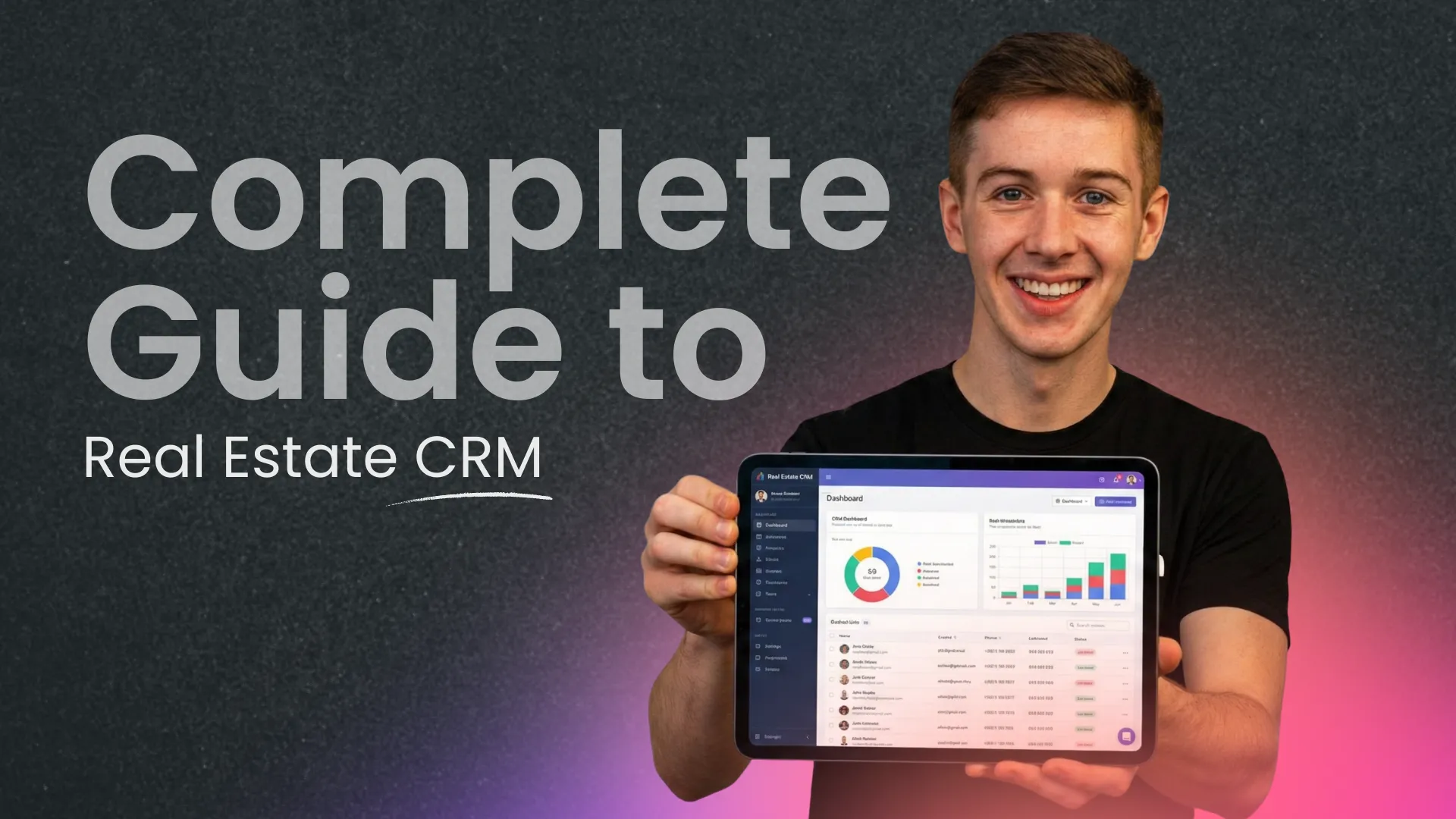
An AI website builder for real estate agents is a tool designed to create professional, personalized websites quickly and without the need for coding skills. It helps agents showcase their listings, engage potential clients, and simplify digital marketing efforts through automation and AI-driven features. This technology allows real estate professionals to build efficient, attractive websites that improve their online presence and save valuable time.
These AI-powered platforms often include features like automated client interaction, optimized property displays, and mobile-friendly designs tailored specifically for the real estate market. They streamline the process of creating and managing a website, making it accessible for agents who want to focus more on selling and less on tech details.
Launch Your App Today
Ready to launch? Skip the tech stress. Describe, Build, Launch in three simple steps.
BuildWith the competitive nature of real estate, having an effective online tool is crucial. AI website builders offer agents an advantage by delivering fast, easy-to-use solutions that help them stand out and connect with clients more effectively.
What Is an AI Website Builder for Real Estate Agents?
An AI website builder for real estate agents uses artificial intelligence to streamline site creation, enhance listing presentations, and optimize user experience. It enables agents to build customized, professional websites efficiently, with features tailored to real estate marketing needs. These platforms differ significantly from traditional builders by automating design, content, and functionality based on real estate-specific data.
AI-Powered Site Creation Explained
AI website builders use machine learning algorithms to automate the design and development process. When a real estate agent inputs property data, the AI suggests layouts, images, and content optimized to attract buyers and engage visitors.
The platform typically includes drag-and-drop tools combined with AI-driven templates that adapt to various real estate niches. This ensures that listing details, photos, and virtual tours are displayed effectively without needing deep technical skills.
These builders also analyze user behavior and market trends to continuously improve site performance and lead generation, making the website more responsive to potential client needs.
Importance for Real Estate Professionals
For real estate agents, a professional online presence is critical to attract clients and showcase properties effectively. AI builders reduce the time and cost of creating such sites, allowing agents to focus on sales rather than technical setup.
They also help agents differentiate themselves in a crowded market by offering enhanced presentation features such as AI-enhanced photos, auto-generated descriptions, and easy integration with MLS listings.
The ability to launch a high-quality website quickly improves agents’ marketing agility and client engagement, critical factors in closing deals and building reputation.
Key Differentiators from Traditional Builders
Unlike traditional website builders, AI website builders focus specifically on real estate requirements. They automate site creation based on property data rather than manual design choices alone.
AI tools offer real-time suggestions for content improvements and SEO optimization that traditional builders lack. This helps agents attract organic traffic and convert leads more efficiently.
Furthermore, AI platforms often include integrations with real estate software, CRM systems, and marketing tools, centralizing workflows in one environment to boost productivity.
Core Features of AI Website Builders for Realtors
AI website builders designed for real estate professionals focus on streamlining property showcasing, enhancing client interaction, and optimizing operational efficiency. These platforms often leverage smart automation, tailored design options, and integrated management tools to help agents maintain a competitive online presence without requiring technical skills.
Automated Listing Integration
AI website builders commonly include automated MLS or IDX listing integration, which syncs property data directly onto the website. This feature ensures listings are always up-to-date, reducing manual updates and minimizing errors. It also allows agents to present comprehensive information—photos, prices, descriptions—accurately and in real-time.
Some platforms use AI-generated blueprints to automatically organize and format listings for a clean and professional presentation. This automation accelerates website setup and supports consistent property display. Additionally, data compliance and security checks like GDPR and SOC2 help protect user data during listing integration.
Customizable Templates for Property Showcases
Customizable templates provide agents with flexible layouts designed specifically for real estate content. These templates accommodate high-quality images, video tours, and detailed property specs. AI builders often offer drag-and-drop functionality paired with automatic styling suggestions that match realty branding.
Templates include modules for neighborhood information, agent bios, and client testimonials, helping build trust and SEO-friendly content. They adapt to both luxury and volume market needs, allowing realtors to personalize key elements while maintaining professional consistency.
Lead Capture and CRM Tools
Effective lead capture features are a priority in AI real estate builders. They usually come with embedded contact forms, appointment scheduling, and live chat widgets to engage potential buyers instantly. Many platforms also integrate CRM tools that track leads, automate follow-ups, and analyze client interactions through dashboards.
The use of analytics dashboards gives realtors insights into user behavior and campaign performance, supporting data-driven decisions. Automating lead qualification and communication improves pipeline management, helping agents convert visitors into clients more efficiently.
Mobile Responsiveness and Accessibility
Mobile responsiveness is essential, as many property searches happen on smartphones and tablets. AI website builders create sites that automatically adjust layouts, images, and navigation for various screen sizes. This ensures an optimal user experience on all devices.
Accessibility features, such as keyboard navigation and screen reader compatibility, help broaden the site’s audience and comply with legal standards. Combined with mobile optimization, these elements increase engagement and improve search engine ranking, enhancing site visibility.
Benefits of Using No-Code Platforms Like Imagine.bo
No-code platforms like Imagine.bo enable real estate agents to build functional, customized websites without coding skills. These platforms combine ease of use with powerful infrastructure and ongoing expert support to meet both immediate and long-term needs.
Zero-Code App Creation
Imagine.bo allows users to create fully operational real estate websites with zero coding required. Its intuitive drag-and-drop interface lets agents design property listings, client forms, and interactive maps without technical knowledge. This reduces time-to-launch significantly.
Pre-built templates focus on real estate-specific features, ensuring relevant functionality out of the box. Users control site adjustments, from visual design to workflow automation, without waiting on developers. The platform also integrates AI tools to enhance search capabilities and lead generation directly within the builder.
Scalable Infrastructure and Hosting
Websites built on Imagine.bo are hosted on scalable cloud platforms like AWS, Google Cloud Platform (GCP), and Vercel. These providers guarantee reliability, fast load times, and global distribution, critical for agencies with growing traffic or multi-location operations.
Scalability ensures the website can handle increased visitors, property images, and data without degradation. Additionally, the platform manages security protocols and backups automatically, relieving agents from infrastructure management.
Expert Support and Maintenance
Imagine.bo provides dedicated expert support, assisting users through setup, customization, and troubleshooting. This continuous assistance is essential for non-technical users who need timely responses to complex issues.
Maintenance tasks such as software updates, performance optimization, and security patches are handled proactively by the platform team. This reduces downtime risk and allows real estate professionals to focus on client engagement rather than technical upkeep.
How AI Website Builders Streamline Real Estate Marketing
AI website builders optimize key marketing tasks, reducing manual effort while improving effectiveness. They focus on creating tailored property content, managing consistent online presence, and enhancing search engine visibility for specific local markets.
Personalized Content Generation
AI website builders use data-driven models to create customized property descriptions, blog posts, and client communications. These tools can analyze listing details, neighborhood traits, and market trends to generate content that resonates with targeted buyer personas.
This AI-generated blueprint helps agents present properties clearly and persuasively, making listings more appealing without extensive writing. By automating content creation, agents save time and maintain a professional tone aligned with their brand.
Automated Social Media Sharing
Managing social media is time-consuming for real estate professionals. AI website builders automate posting schedules, optimize content formats, and target the best times for audience engagement.
They integrate with platforms like Facebook, Instagram, and LinkedIn to distribute new listings, market updates, and open house announcements. Automated sharing ensures consistent visibility across channels, increasing lead generation without extra manual work.
SEO Optimization for Local Markets
Local search relevance is crucial in real estate. AI website builders analyze local keywords, competitor strategies, and user behavior to optimize website content for search engines.
They implement location-specific metadata, optimize loading speed, and structure property information to improve rankings for queries like “homes for sale in [city].” This targeted SEO approach helps agents capture qualified local traffic and convert more leads.
Security, Compliance, and Professionalism for Real Estate Websites
Real estate websites require stringent security measures and compliance with legal standards to safeguard client data. Maintaining high-quality site standards ensures professional presentation and builds trust with users. These factors collectively support a reliable and secure online platform tailored for real estate professionals.
GDPR and SOC2 Compliance
Real estate websites collecting personal data must comply with GDPR if they handle information from EU residents. This regulation mandates clear consent mechanisms, data minimization, and the right for users to access or delete their data. Non-compliance risks significant fines and damage to reputation.
SOC2 compliance is essential for platforms that store and manage client data in the U.S. It focuses on controls around security, availability, processing integrity, confidentiality, and privacy. Meeting SOC2 standards means implementing rigorous internal policies and regular audits, ensuring that data handling processes are transparent and secure.
Both frameworks require ongoing monitoring and updates to accommodate evolving regulations and security threats, making adherence vital for trustworthy real estate websites.
Data Protection for Clients
Protecting sensitive client information is a top priority on real estate websites. Data protection strategies include encryption of data in transit and at rest, use of secure login protocols, and multi-factor authentication to prevent unauthorized access.
Regular security audits and penetration testing help identify vulnerabilities in the website’s infrastructure. Additionally, AI-driven threat detection can flag suspicious behavior automatically, improving real-time defense against phishing and ransomware attacks.
Implementing secure hosting environments and complying with privacy policies ensures that financial and personal client information remain confidential throughout transactions.
Professional-Grade Quality Assurance
Professional-grade websites exhibit reliability and polished functionality, which reflect positively on agents and agencies. This includes optimized site speed, mobile responsiveness, and intuitive navigation to create a seamless user experience.
Quality assurance involves comprehensive testing for broken links, loading errors, and compatibility across browsers and devices. Regular updates and maintenance prevent glitches that could undermine user trust or SEO rankings.
AI website builders tailored for real estate often incorporate automated quality checks, ensuring consistency in design and content presentation while minimizing manual errors. This level of professionalism is crucial for maintaining credibility in a competitive market.
Comparing AI Website Builders: Key Criteria for Realtors
Selecting the right AI website builder for real estate agents depends on factors such as user experience, the ability to tailor the site to individual branding needs, and transparent pricing. These elements directly affect how quickly agents can launch an effective website, maintain consistent brand identity, and manage costs.
Ease of Use and Onboarding
Ease of use is critical for real estate agents who often lack technical skills. The best AI builders offer intuitive drag-and-drop editors and automated setup processes that require no coding knowledge. Many platforms also include AI-driven content generation and image suggestions, speeding up site creation.
Onboarding typically involves simple guided tutorials that walk users through setting up essential pages like listings, contact forms, and lead capture. Some builders provide beta versions with early access for testing new AI features, allowing agents to explore innovations without commitment.
Clear and responsive customer support during this phase can reduce setup time and prevent frustration. Overall, smooth onboarding removes barriers and lets agents focus on showcasing their properties.
Customization and Branding Options
Customization options vary, but realtors should prioritize platforms that allow deep branding control. This includes editable color palettes, fonts, logo placement, and customizable page templates designed specifically for real estate.
Strong AI builders also let agents create multiple service pages, such as property listings, market updates, and client testimonials, frequently optimized with SEO tools for better search ranking. Some emphasize dynamic content capabilities, helping sites stay current with evolving inventory and market trends.
Branding flexibility extends to integrating third-party tools like CRM systems or virtual staging services, ensuring the website fits seamlessly into broader marketing workflows without compromising style.
Pricing Models and Free Trials
Transparent pricing is essential for agents managing tight budgets. Most top builders offer tiered paid plans based on features, number of listings, or bandwidth limits. Entry-level plans might start at just a few dollars per month, with higher tiers unlocking advanced AI-driven tools and priority support.
Many companies provide free trials or limited-functionality beta accounts, allowing agents to test the software before committing financially. Free trials typically last 7 to 30 days, offering enough time to evaluate ease of use and customization capabilities.
It is important that agents inspect any additional fees for add-ons or premium integrations to avoid unexpected costs. Providers with clear pricing breakdowns and no hidden charges support smarter investment decisions.
Step-by-Step Guide to Building a Real Estate Website With Imagine.bo
Imagine.bo streamlines the website creation process by turning your real estate app concept into a functional site quickly. It relies on a clear input of your idea, generates a detailed blueprint using AI, and offers a smooth launch with easy tools and professional support. This combination saves time and ensures essential features are in place.
Describing Your Real Estate App Idea
The process begins with the user clearly describing their real estate app idea. Imagine.bo prompts for specifics like target audience, types of properties featured, and desired functionalities such as property search, maps, or appointment scheduling. Precise input ensures the AI understands the core objectives of the site.
The platform encourages detailing branding preferences and key pages needed, including listings, agent profiles, or client resources. This initial description forms the foundation for the design and feature set. A well-defined idea helps Imagine.bo tailor the final website to meet practical needs without unnecessary complexity.
Using the AI-Generated Blueprint
Once the idea is provided, Imagine.bo’s AI instantly produces a comprehensive blueprint. This blueprint outlines the site’s architecture, page layout, navigation flow, and essential elements like IDX integration or lead capture forms.
Users can review and adjust the AI’s suggestions, ensuring the blueprint matches their vision before moving forward. This step allows for early customization and prevents costly changes later. The AI helps balance functionality and user experience with proven real estate website practices embedded in its design logic.
Launching With One Click and Expert Backup
After finalizing the blueprint, Imagine.bo offers a one-click build feature that creates the live website efficiently. The platform handles hosting, domain connections, and responsive design to make the site accessible on all devices.
If users need further customization or run into issues, expert backup support is available. This professional assistance ensures the site functions correctly and aligns with client expectations. Users benefit from a fast launch combined with reliable backup, reducing technical barriers and time to market.
Success Stories: Real Estate Agents Leveraging AI Website Builders
AI website builders have empowered agents to launch sites quickly, manage multiple projects efficiently, and expand their businesses using scalable tools. These advancements have transformed workflows for small agencies, solo makers, and founders aiming to develop minimum viable products with minimal technical effort.
Case Studies of Rapid Launches
Several real estate agents have launched fully functional websites within hours using AI-powered builders. These platforms automate design, content creation, and listing integration, enabling agents to skip extensive coding or design work.
For example, solo makers have taken advantage of streamlined workflows to go live with lead-generating landing pages in less than a day. Small agencies report that even non-technical team members can produce professional sites fast, helping them respond to market demands with agility.
The speed of launch not only improves time-to-market but also supports testing minimum viable products before full-scale development. This dynamic enables agents to validate concepts without heavy investments.
Managing Multiple Client Projects
AI website builders simplify handling several real estate projects at once. Agents and small agencies often juggle multiple client sites, each requiring custom features and frequent updates.
By using AI tools with template customization and automated content updates, agents reduce manual tasks significantly. These platforms offer centralized dashboards for tracking progress and managing listings, minimizing errors and inconsistencies across projects.
Founders benefit as well, using these builders to prototype and iterate new client websites rapidly. Efficiency gains allow them to increase output without hiring additional developers, maintaining quality while scaling workload.
Growth Through Scalable Tools
AI builders support long-term growth by offering scalable solutions tailored to real estate professionals. Features like automated SEO, lead capture, and CRM integration adapt to growing business demands without complex reconfiguration.
Small agencies and founders can start with basic site versions and progressively add functionalities, turning a minimum viable product into a comprehensive online presence. This incremental scaling reduces upfront costs and technical debt.
Additionally, scalable AI tools help agents track performance metrics and optimize marketing efforts. This data-driven approach fosters informed decision-making, enhancing lead generation and overall client engagement.
How to Get Started With Imagine.bo as a Real Estate Professional
Imagine.bo offers a streamlined process to start building AI-powered websites tailored for real estate agents. Users begin by gaining access through a private beta or waitlist, followed by setting up their profile to align with their business needs. Planning the website focuses on showcasing listings and generating leads efficiently.
Joining the Waitlist and Beta Access
Real estate professionals interested in Imagine.bo should join the waitlist to secure a spot in the private beta, which began rolling out in June 2025. Being part of the waitlist ensures early access to the platform’s features before the public release.
The private beta allows users to test functionality with feedback opportunities to improve the tool. Once accepted, participants gain priority access to build and customize their real estate websites without coding, benefiting from AI-driven features aimed at accelerating launch times.
Setting Up Your Profile
After access is granted, setting up a profile is crucial for personalized website creation. Users input basic business information such as agency name, contact details, and service areas, ensuring the platform tailors content and design accordingly.
Imagine.bo also guides users in connecting property listings and integrating client contact systems. This setup supports lead generation by embedding calls to action and inquiry forms directly into the site, optimized through AI recommendations.
Planning Your First Real Estate Website
Planning focuses on user experience and lead conversion. Agents should outline which property types to feature, prioritize local market data, and decide on essential site sections like listings, about pages, and client testimonials.
The platform’s AI suggests layouts designed to highlight property images and details efficiently. Users can also specify marketing goals, such as building a newsletter list or scheduling property tours, allowing the AI to customize tools and plugins suited to those aims.
Future Trends: AI and the Digital Real Estate Landscape
AI is driving significant changes in how real estate professionals engage clients, use technology, and grow their businesses. These advances focus on meeting higher client expectations, adopting innovations tailored for agents, and leveraging scalable tools for expansion.
Evolving Client Expectations
Clients now expect quick access to personalized property data and seamless communication across digital platforms. AI enables websites to offer instant responses through chatbots and customized property recommendations based on detailed user behavior analysis.
Real estate agents must provide immersive virtual tours and real-time updates on listings. These features enhance the buying experience by delivering transparency and convenience. AI-powered tools allow agents to anticipate client needs, improving satisfaction and retention without increasing manual workload.
As client preferences shift toward mobile and online engagement, websites built with AI must adapt swiftly. Nimble platforms that use AI to track evolving trends ensure agents stay competitive in a changing market.
AI Innovations for Realtors
AI assists agents in automating routine tasks such as content generation, lead qualification, and CRM management. For example, AI website builders can generate compelling property descriptions and optimize marketing campaigns based on predictive analytics.
Machine learning enhances property valuations by analyzing market data instantly, helping agents present accurate prices and improve decision-making. AI-driven platforms integrate with multiple tools, streamlining operations and reducing human error.
These innovations support realtors by freeing up time for client interactions and strategy, allowing them to focus on closing deals. Adoption of these AI tools is becoming crucial for maintaining efficiency and relevance in 2025’s fast-paced real estate environment.
Scaling and Growth Opportunities
AI-driven website builders offer scalable solutions capable of growing with an agent’s expanding portfolio or team. They provide centralized dashboards for managing multiple listings, clients, and campaigns from one interface.
Scalable AI platforms allow realtors to customize features and workflows to fit business size and goals, avoiding the need to switch systems as they grow. Automation of lead nurturing and sales funnels increases conversion rates without additional staffing.
By harnessing AI technology, agents can access insights and operational efficiencies that support sustainable growth. This approach is vital for maintaining competitiveness as the digital real estate landscape becomes more complex and data-driven.
Launch Your App Today
Ready to launch? Skip the tech stress. Describe, Build, Launch in three simple steps.
Build





